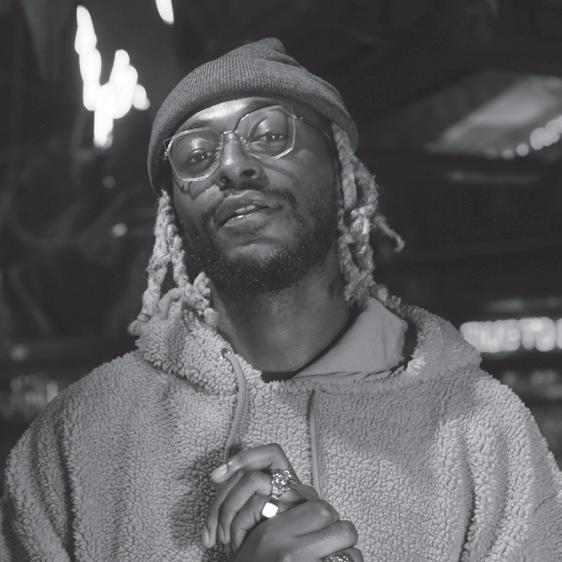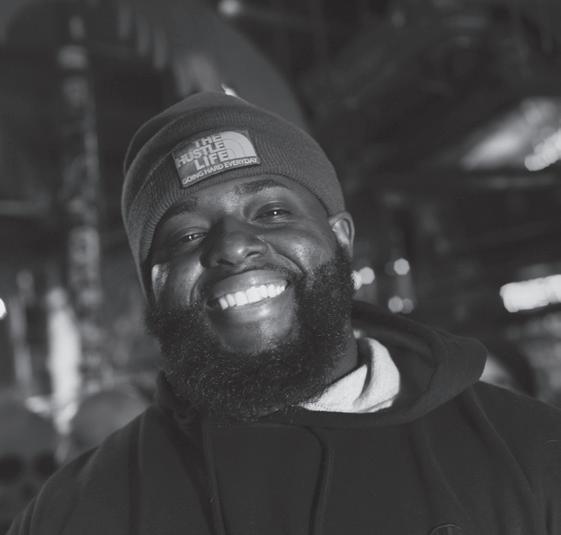
6 minute read
Film
The shocking death of Chadwick Boseman
JIM KEOGH
Advertisement
When I scan the T&G in the morning, I start from the obituaries. It’s my first read of the last call.
You might think this morbid, but I see it differently. My initial interest is to learn whether I know someone who’s passed — something my grandparents used to do, then my parents, and now me. The older I get the greater the likelihood of spotting a familiar name. Many people I interviewed during my reporting days have died: World War II vets who recalled their combat experiences, sometimes through tears; amateur historians of the Wachusett towns I covered; teachers, politicians, and, sometimes, former co-workers with whom I’d fallen out of touch, despite our shared insistence that we never would.
I’m most intrigued by the stories. Every day I make it a point to read at least one obituary of someone I hadn’t known. Where did they work? What were their hobbies?
L I S T E N U P CONTINUED FROM PAGE 16
arresting, as is the call-and-response of “Espresso” and the pugilistic spirit of “Heat Rises.” Lux is given a lot of lyrical space, maybe more than Deyj herself, but it takes a few listens for that to really stand out: He’s got a steadiness that well balances Deyj’s more rough-and-tumble flow. It’s a brisk little effort, at a mere four tracks, but when the final song, “Hot Topic Deluxe,” rolls to a close, there’s a definite sense of satisfaction.
“Social Absence,” by Cliff
Notez: In a mere three songs, Notez manages to take the listener on a tour of the sense of anxiety and alienation that permeate the current moment. The opening number, “Voodoo Doll,” is a robust piece of work, with Notez capturing a sense of mania as the song builds to a fever pitch, descending at the end to a short interlude of jazz before giving way to the paranoia-laced “Spiral.” “I’m not swimming in this spiral,” he raps, “I’m just trying to stay afloat/I should look them in the eye/show them that I got a soul.” The whole What gave them joy? Whom did they leave behind? Within only a few paragraphs a human being emerges — not full-blown portrait, but now not a complete stranger.
The young deaths make you gasp, and are the hardest to absorb. And when youth is coupled with celebrity, it’s an earthquake.
What a shocking development then to wake up on Sunday morning and learn that Chadwick Boseman had died of colon cancer at the age of 43. He’d kept his diagnosis concealed from the public for four years, and did so very well. Who could have guessed the finely muscled physique inside the Black Panther costume had been bullied by multiple surgeries and chemotherapy treatments?
In his too-brief career, Boseman had come to define Black heroism on screen in both its fictional and true-life incarnations. In addition to the regal T’Challa in “Black Panther” and the recent “Avengers” movies, he played baseball legend Jackie Robinson in “42,” Supreme Court Justice Thurgood Marshall in “Marshall” and singer James song reverberates with a sense helplessness and a lack of control, and that discordant vibe nestles its way into the listener’s chest. It all resolves — as well as these things can — with the controlled vocal grind of “Repeat,” where Notez ponders cycles of both social and personal pain: “From your lips to God’s ears,” he raps, “We are still here.”
“REDvolution,” by Jazzmyn
RED: Boston rapper RED creates here a multilayered sonic landscape that reaches back to the likes of Gil Scott-Heron and Billie Holiday, building off their iconic work while speaking to a contemporary audiBrown in “Get on Up.” Spike Lee must have known of Boseman’s health challenges when he enlisted him to play Stormin’ Norman in the Vietnam saga “Da Five Bloods.” Lee says he could envision no one more capable of portraying the warrior supreme whose battlefield death still haunts his buddies, even if Boseman’s condition was growing precarious.
The sense of loss we feel when an actor like Boseman dies is largely about us — we mourn the performances we will never see, we grieve the lost kinship we’d internalized from his movies and late-night interviews (not only was Boseman a fine actor, he also seemed to be a solid guy). Boseman, of course, didn’t know us from Ant Man. That’s the deal we strike with film stars: We admire their work, and we hope they maintain some awareness of our collective appreciation.
Someone else will play Black Panther one day. We’ve chugged though multiple Batmans (and Jokers), Supermans and SpiderMans in a relatively brief span, and ence. It’s an absolutely spellbinding piece of work, with songs such as the title track, which echoes ScottHeron’s “The Revolution Will Not Be Televised,” and the subsequent “Cry No More” tracing the outlines of the artist’s own psychic armor: “Making pain into poetry,” as she raps in the latter song. From there, she delves into an archaeology of pain and heartache. On “ShootHER” she raps, “How can you defile a child and feel no consequence?/how can you abuse a woman and condemn
Chadwick Boseman starred in the iconic superhero film, “Black Panther.” He died Aug. 28 at the age of 43.
MARVEL STUDIOS/DISNEY
Boseman’s death will not slow the march of a franchise character. I’ve already found myself spinning through a roster of actors most likely to next wear the coolest costhe closing number, “We Gon Make It.” “I’m gonna speak my truth,” she raps, “even if my voice shakes.” The album’s a stirring piece of work, one that positively radiates with energy and defiance, and it’s immensely tume in the Marvel Universe.
But that’s a conversation for another day. A talented man has died young. I was a fan of his work, and I
CLIFF NOTEZ/CHRISTINE PETERSON


JAZZMYN RED/PROMOTIONAL PHOTO

on the environment.” RED isn’t holdsingles are less about competition ing anything back on this album, and and trying to top one another, as that makes for a gripping listening the titles would suggest, and more experience. When she takes a more about having one another’s back in R&B turn with “Monster,” it both /CHRISTINE PETERSON breaks up the album’s energy and recasts the political narrative: “You’ve created a monster,” she sings, and it’s an act of defiance, a pushback against the cultural toxicity that the album’s been illustrating. This is, ultimately, an album with bite, but it’s also one with hope, as illustrated by GHOST OF THE MACHINE regret I won’t see more of it. rewarding. an insane world, especially in the latter song where they’re insinuating
“’98 Sosa,” “Bonds & McGuire” taking bats to neo-Nazis’ heads and and “Power Hitters,” by Juice rapping lines like, “I march with you, Headz: Worcester-area rappers Dark Phoenix/to try and influence Ghost of the Machine and Weapon the White Supremacists.” This is E.S.P. have hit a number of home some bare-knuckled work from the runs in their hip-hop career, both pair, set to some interesting, offseparately and together (such as kilter beats. There’s a heaviness and on their Savageland project earlier a touch of darkness to the work, but this year), but here they seem to there’s a sense of momentum that be leaning into the idea a little helps transform the music’s weight literally. Surprisingly, though, these into power.










